Was your CPP disability denied? If so, you have stumbled upon the right article. As part of our Ultimate Guide to CPP Disability, I am going to share a simple seven-step process you can use to do your CPP disability reconsideration appeal. This seven-step CPP disability appeal process is based on my experience helping hundreds of people with reconsideration appeals.
I’ll start with a short review of how reconsideration appeals fit in with the larger CPP disability claim process. Then, I’ll go through the seven steps you can follow to do your appeal, followed by common reasons for a denial and mistakes to avoid.
Let’s get to it.
Have you had your CPP disability denied?
This article is your guide to a CPP reconsideration appeal. We are going to explain how the CPP appeal process works, how to apply it, common mistakes and reasons for denials. We often tell people to try a reconsideration appeal on their own and see how it goes before hiring a representative. However, sometimes, it’s best to work with an experienced disability lawyer from the get-go, as even small mistakes could jeopardize your entire claim.
If you are someone who is dealing with a denied disability claim that involves a lack of treatment, surveillance, an inability to meet the program’s definition of disability, or a failure to meet procedural deadlines, we recommend talking to a disability before starting your appeal.
If you’re interested in working with one of our CPP disability lawyers, click on the button below to schedule a free case evaluation with one of our experienced disability claim consultants.
Can I request a CPP disability reconsideration?
Yes, if your CPP disability claim gets denied, you have the right to request a reconsideration. This is the first level of appeal that is more informal than the other levels. You are asking a medical adjudicator hired by CPP disability to reconsider your denial and ultimately approve your claim.
How a CPP disability appeal works
If Service Canada denies your claim for CPP disability benefits, you’re entitled to four levels of appeal:
- Reconsideration
- Social Security Tribunal – General Division
- Social Security Tribunal – Appeal Division
- Federal Court of Appeal
This article focuses on the first level of appeal, which is the reconsideration appeal. The reconsideration appeal is made directly with Service Canada. It is usually handled by the same medical adjudicator who made the decision to deny your application.
You do the CPP disability reconsideration appeal by submitting a written request to do so. You then try to convince the decision-maker (i.e. medical adjudicator) to reverse their earlier decision by providing them with new information and documents.
A reconsideration appeal is an exercise in legal advocacy. It is important to understand that your appeal will not be decided based on the “truth” of your situation as you know it. Rather, the decision-maker will make a decision based on how well that truth is communicated in the documents presented in your appeal. It is not enough for you to present the truth; rather, you must present it in a way that will persuade the medical adjudicator.
It is beyond the scope of this guide to teach you everything about how to be persuasive, but I give a high-level overview in “The Best Story Wins: The Secret to Winning Your Disability Claim.”
CPP appeal process
What follows is a simple seven-step process you can use to do your reconsideration appeal.
1. Verify you’re at the CPP disability reconsideration stage
You have a lot on your plate, so it is possible to be mistaken about what level of appeal you’re at. It might seem silly, but we see this happen all the time. You don’t want to do a reconsideration appeal if you should really be doing an appeal to the Social Security Tribunal. This is a major mistake because appealing to the wrong agency can cause you to miss deadlines.
So, let’s first confirm that you’re actually at the CPP disability reconsideration appeal step. You will need the denial letter you got in the mail from Service Canada to compare. There is an easy way to know for sure that you’re at the reconsideration appeal step. The first paragraph of the letter will have the heading “CPP disability decision,” and it will look exactly like this:
If the opening paragraph of your letter looks like this, then you know your next step is indeed the reconsideration appeal. Note that it references the date they received your application (blacked out in my example).

Now that you know for sure you’re at the reconsideration appeal, let’s move to Step 2.
2. Identify your CPP disability appeal deadline
You have a deadline to request a reconsideration of the unfavourable decision. The deadline is always 90 days from the date you received the decision letter from Service Canada.
The first thing you need to do is figure out your deadline. For simplicity and to avoid any arguments over when you got the letter, we recommend that you use the date on the letter to calculate your 90-day deadline.
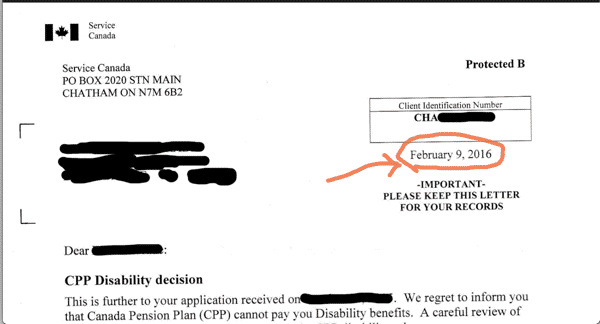
For example:
The date on the letter included above is February 9, 2016. Even if you received the letter on February 11, you still want to use the date on the letter. You would then count forward 90 days from February 9, 2016, with the first day being February 10. In this case, the result is May 9, 2016. That would be the 90-day deadline to request your reconsideration appeal if your application denial letter was February 9, 2016.
If you’re like me and aren’t totally confident in your counting abilities, you can use TimeAndDate.com’s online calculator to calculate the exact deadline. Just fill in the date of the letter, select “Add,” input 90 days’ time, and click “Calculate New Date.”
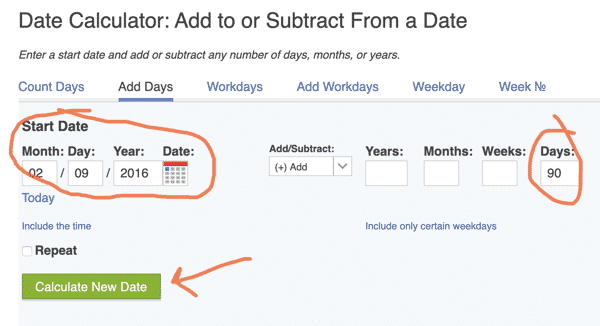
3. Request the reconsideration appeal
Now that you know your deadline, it is critical that you request the reconsideration before that deadline. You can request the reconsideration appeal by writing a letter or by submitting Service Canada’s Form: Request for Reconsideration of a Canada Pension Plan Disability Decision SC-ISP 1145 (2018-10-09).
We recommend you use Service Canada’s form in order to ensure you provide them with all the required information. If you just write a letter, you may forget to give them the necessary information, and your appeal request could be rejected.
Many people wrongly believe that they can only request the reconsideration once they have all the appeal documents ready to send in. This is not true. In part 3 of the Form, you can indicate that you are going to send in more information later.
Service Canada’s form has five sections. Take care to fill them out properly:
Section 1: Applicant information
Make sure to include your full, correct contact information.
Section 2: Information about the decision
Fill in the date of your decision letter regarding your application denial. I reviewed this above in Step 2. Check the box to say you’re sending the form before the end of the 90-day reconsideration period. If you’re past the 90-day period, then you will need to provide reasons for the delay where indicated.
Section 3: Information you want us to consider
Check the box that best describes your situation. If you’re still intending to send more information that you haven’t received yet, then you need to check box 3. There is space for you to list the documents you’re waiting on and to give dates you anticipate receiving the documents. You should fill this out whenever possible.
Section 4: Reason for reconsideration
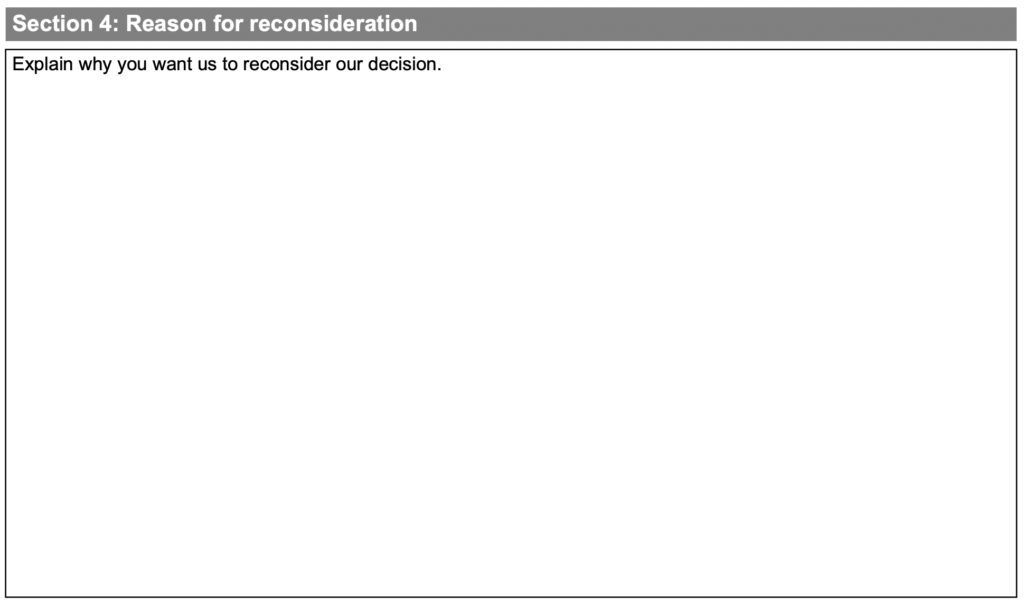
In this box, you need to give the reason(s) why you want the Medical Adjudicator to reconsider their decision.
Section 5: Declaration and signature
Assuming you’re able to sign your own signature, there are three things you need to do here:
- Check the box under the “Declaration” heading
- Sign where indicated, and
- Fill in the date where indicated.
Also, you need to sign this in ink. Service Canada will not accept electronic signatures or faxed or emailed copies of signed documents. You need to send them the original ink-signed document. Make sure you save a copy for your records.
Medical adjudicators will allow you a reasonable amount of time to get the rest of your documents into them. They understand there can be delays in receiving records from doctors or other third parties; however, you have to show that you’re trying to get them. If you’re procrastinating on getting the records, the medical adjudicator will eventually make a decision based on the information you have already provided. Obviously, this is not ideal.
The final step is to send your reconsideration request to the correct Service Canada address. Make sure you send it to the same address as the denial letter you received from Service Canada. Each province has its own designated Service Canada office for processing CPP disability claims. If you need to check for the address you will be sending it to, we have these listed on our Ultimate Guide to CPP Disability page under the heading “CPP Disability Offices by Province and Territory.”
Second, be aware that you cannot fax, email or courier any documents to Service Canada. They will only accept paper documents by mail.
We recommend you use Canada Post Xpresspost as we have found that it always gets delivered. You also receive a confirmation number to prove that you mailed the request for reconsideration within the 90-day deadline.
4. Identity supporting documents and information you need
Now that you have requested the CPP disability reconsideration appeal, you need to get to work putting together the documents for your appeal. Generally speaking, you will need to provide new documents or information to have a successful appeal.
Remember, you’re asking the medical adjudicator to reverse their own decision to deny your claim. Unless you give them a good reason to change their mind, they are going to stick with their original decision.
So, how do you know which documents or information to send? This is the hardest part of doing any appeal — including reconsideration appeals.
The short answer is that you need to get the information and documents necessary to support a winning narrative for your appeal. I discussed this in a previous article called “The Best Story Wins: The Secret to Winning Disability Benefits.”
Crafting a winning narrative is not easy. I recommend you use what I call the “reasons for denial” matrix. This might sound complicated, but it’s really just a chart to help you sort everything out.
To create this matrix, you will need the original application denial letter you received from Service Canada. Then, go through the letter to underline the medical adjudicator’s reasons for denial and the information or clarifications requested of you.
For example:
In the following CPP denial letter, I have underlined and numbered the medical adjudicator’s three reasons for the denial.
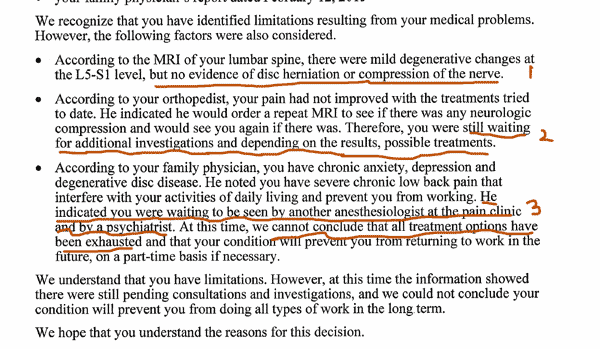
You can now take these three reasons and put them into the “reasons for denial” matrix. Then, for each reason for denial and information request, you will identify what you need to provide in order to refute the reason for denial.
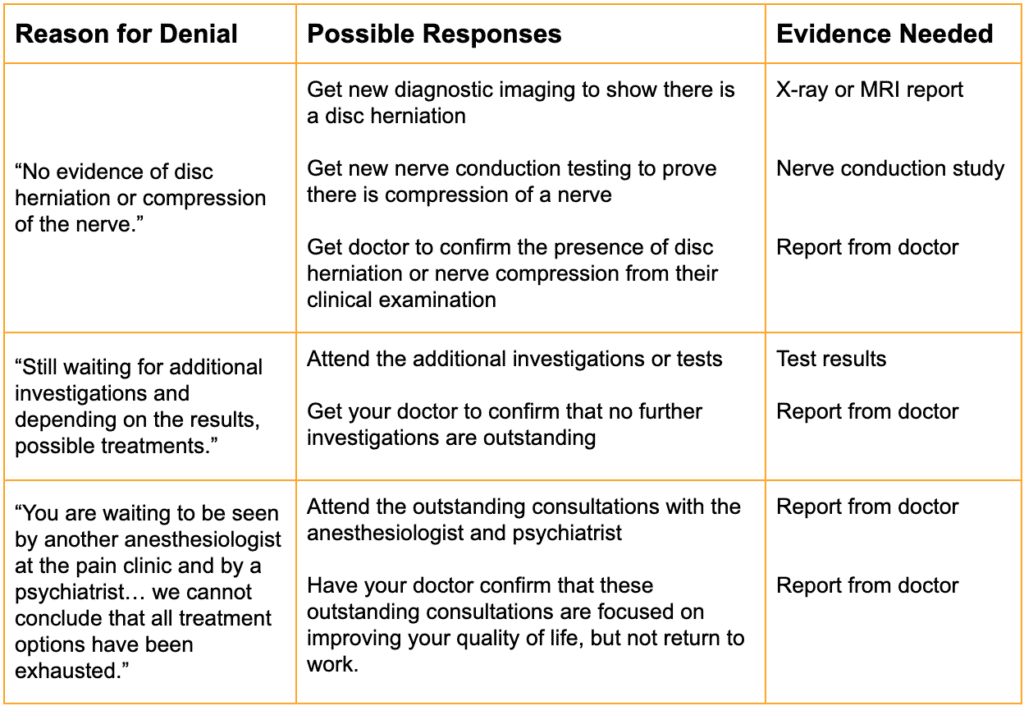
When you focus on refuting the reasons for denial, you give yourself the best chance of convincing the medical adjudicator to change their mind.
5. Write your appeal letter
Once you have gathered the information and documents you identified in your appeal matrix, the next step is to write your appeal letter.
For more information on how to write your appeal letter, check out our CPP disability appeal letter sample.
Make an opening sentence that explains why you are appealing
The error most people make is putting too much information into the appeal letter. An effective appeal letter will give an opening sentence identifying the decision you’re appealing:
I am writing to appeal the decision dated January 30, 2019. I have already provided you with my request for reconsideration of a CPP disability decision.
List the documents you are attaching
You will want to indicate the documents you’re attaching in a bulleted list. For each document, give the name and date obtained. For medical records, indicate the time period covered by the records.
In support of my appeal, I am attaching the following documents:
- Updated Clinical File of Dr. Smith from September 2, 2018, to June 5, 2019
- Medical consultation report of Dr. B. Honeydew (Psychiatrist) dated May 24, 2019
- Medical report of Dr. Smith dated June 5, 2019
- Shoppers Drug Mart prescription medication printout from January 1, 2017, to June 5, 2019
- MRI report dated May 9, 2019
Discuss new information
Then, you would move on to discuss any new developments that Service Canada should be aware of. This could be a new diagnosis, a treatment that was just started, new failed work attempts, etc.
There has been new medical information since the date of your decision, January 30, 2019. I have attended my family doctor for three visits; I have attached the updated clinical notes describing these visits; I have attended a consultation with a psychiatrist, Dr. B. Honeydew. His consultation report is attached. I also underwent an MRI of my spine on June 5, 2019. The MRI report is attached. I have an appointment with the pain clinic coming up on August 21, 2019.
List each reason for denial and why it is no longer valid
Then move on to the most important part of the appeal letter. List each reason for denial and then explain why this reason is no longer true. Discuss the information that refutes the reason and reference where they can find this information in the new documents attached.
In the letter dated January 30, 2019, you gave the following reasons for denial:
- “There is no evidence of disc herniation or compression on the nerve.”
- “You are still waiting for additional investigations and, depending on the results, possible treatments.”
- “You are waiting to be seen by another anesthesiologist at the pain clinic and by a psychiatrist… we cannot conclude that all treatment options have been exhausted.”
Based on recent developments, I can confirm that these reasons for the denial are no longer applicable for the following reasons:
- I underwent an MRI on June 5, 2019, which confirmed the presence of a disc herniation at L5-S1
- My family doctor has confirmed in the attached letter dated June 5, 2019, that we have completed all investigations and tests.
- I have now been seen by a psychiatrist who confirms that I suffer from severe depression. He confirms that I am currently not able to work due to depression. He discusses that I am currently taking a new antidepressant medication that is being monitored and adjusted by my family doctor. He states that until my depression is under control, I am incapable of any employment.
- My appointment with the pain clinic and new anesthesiologist is upcoming on August 21, 2019; however, my family doctor has confirmed that the purpose of attending the pain clinic is to improve my quality of life. He confirms there is no expectation by him or the pain clinic that I would be able to return to work. My doctor clarifies this in his letter dated June 5, 2015, which is attached.
Conclude the letter by asking to have your benefits reinstated
You then politely end the appeal letter by asking that the reconsideration be allowed and your benefits approved based on this new information.
6. Send your letter and supporting documents to Service Canada
Follow the same process I outlined in Step 3 to send the reconsideration request to Service Canada. Remember, you must send your appeal documents to the correct address. This will always be the address on the denial letter you received from them. Also, remember that you can’t use a courier to send the documents. Couriers will get returned as Service Canada always uses a post office box. Once again, we recommend you use Canada Post Xpresspost because it will give you a confirmation number and will get delivered to a post office box.

7. Cooperate with any further requests from Service Canada
After receiving your appeal letter and documents, it is common for the CPP disability medical adjudicators to contact you to clarify things or to ask for your assistance in getting more information. One common request is having you sign an authorization form so the medical adjudicator can request information from your employer, doctor or other medical providers.
You don’t need to treat these requests with suspicion. More often than not, the information the adjudicator is seeking will be helpful in your claim. In our experience, most medical adjudicators are acting in good faith to seek information that could support your claim. They are not always trying to build a case against you.
CPP Disability Reconsideration Mistakes to Avoid
Now that you know how to do a reconsideration appeal, let’s overview some common mistakes so you can hopefully avoid them. Keep in mind, that these mistakes are for people who decide to do an appeal on their own without a competent representative or lawyer.
1. Missing the deadline to appeal
Missing the deadline to appeal is perhaps the most common CPP disability reconsideration mistake we see people make. Once you receive the letter denying your application, you only have 90 days to request your appeal.
Additionally, there are rules for how you need to request the appeal; you are required to request your appeal in writing before the 90 days are over.
We see lots of people wait to request the appeal until they have all of their supporting documents together. If it takes a long time to receive the medical file or report, this can cause you to send the appeal in at the last minute or to inadvertently miss the deadline.
You can avoid missing the deadline by requesting a reconsideration appeal immediately after you get the denial letter from Service Canada. Do this in writing using the form provided. Then, attach a cover letter to the form to explain that you are in the process of gathering more documents to support the appeal. Ask that they hold off on making a decision until you forward those documents.
Once you have made a proper request for reconsideration, the 90-day deadline no longer applies. You should still try to get the rest of your documents and information to them before 90 days pass, but Service Canada won’t have a problem if you need a bit more time. However, if you do pass the 90 days, you will need to demonstrate to them that you are working in good faith to get more documents and not just procrastinate the appeal. If they feel you are dragging your feet and not working in good faith to get more information to them, they can make a decision on the information they have on file.
2. Not addressing the reasons for the denial
Another common mistake for a CPP disability reconsideration is to do your appeal without directly refuting the reasons for the denial. In the letter, Service Canada will usually give you the reasons why they denied your application. The easiest way to appeal is to respond to those reasons head-on. Many people will just ask their doctor to write another letter without directing the doctor to speak to the reasons. Others might have the doctor speak to the reasons for denial when some of these reasons are not medical in nature.
The best practice is to list out the reasons for denial — a physical, numbered list — and then gather new information, records or medical opinions to rebut each of the reasons. Once you gather any evidence, the best place for you to refute each reason for denial is in a letter you send to Service Canada as part of your appeal.
3. Not addressing the weakness of your case
We all have blind spots to our own problems or weaknesses. Most people don’t have the level of self-awareness needed to identify and address the personal shortcomings that might have caused a denial of benefits. It is hard to be objective in your own situation. This problem is not just limited to disability claimants — it applies to anyone who represents themselves, including lawyers! This is why the courts frown upon lawyers who try to represent themselves, friends or family members.
Identifying and addressing the weaknesses of our client’s claims is one of the most important things we do when taking over the appeals. The most common case weaknesses are facts that support the argument that you didn’t do all you could to stay at work or to engage in recommended medical treatment. These weaknesses get overlooked because most people believe they did all they could or have excuses for why they didn’t follow certain medical recommendations.
4. Not understanding the rules for late applications and minimum qualifying periods
Not understanding your minimum qualifying period (MQP) or whether your claim is considered a “late application” is a common mistake that results in denial.
Not everyone who has paid into CPP can qualify for CPP disability benefits. To qualify, you must have made the minimum contributions to CPP in 4 of the 6 years leading up to your date of disability onset. This period of 4 of 6 years is known as your minimum qualifying period. This is a bit of an oversimplification; if you want a more nuanced explanation, please see our article and video about the
CPP Disability Minimum Qualifying Period. While you’re at, we also recommend checking out our article on CPP disability retroactive payment, which describes how is cpp calculated.
If you have been off work for over two years and are just beginning to apply for CPP disability, then you will likely have to apply under the “late application” provision. This simply means that your minimum qualifying period has expired — but you can still win the approval of benefits by showing your disability onset happened before your minimum qualifying period ended.
The problem is that most people focus on proving their disability as of the current day (after the MQP has expired) and don’t present evidence to prove the disability onset happened during their MQP. If you are dealing with a late application, I strongly suggest you hire a lawyer. Late application cases are difficult, and you can lose a winnable case for technical reasons.
5. Not providing adequate medical evidence to support your claim
CPP disability claims are approved by decision-makers. For a reconsideration appeal, the decision-maker is a nurse medical adjudicator who works for Service Canada. Medical adjudicators are required to follow the CPP medical adjudication framework. This framework requires the adjudicator to make decisions based on medical evidence. They cannot rely only on the claimant’s own statements about their medical condition, symptoms, and disability.
A common mistake for a CPP disability Reconsideration is to not provide the right medical evidence to support the appeal. This can happen if you don’t provide any supporting medical evidence or simply provide the wrong type of evidence. When we take over an appeal for a client, we almost always have to obtain more medical evidence to support the appeal. Common examples of medical evidence include medical reports that answer specific questions, rehabilitation program records, pharmacy records; or medical records from doctors or other health professionals.
The specific medical evidence required is different from case to case; there is no one-size-fits-all approach. To determine what medical evidence is needed, we typically examine the CPP disability application, the claim file from Service Canada, the existing evidence you have provided, and a list of all your doctors and other treatment providers. If you’re attempting your own appeal, you will have to start by examining these sources as well.
6. Making the wrong type of written submissions
Doing the written submissions is the most difficult part of the appeal. Written advocacy is a skill-intensive process, and most people have no experience or training.
As a general rule for people representing themselves, less is more when it comes to written submissions. If you find yourself writing more than five double-spaced pages of written submissions or legal arguments, then you are likely going too far.
The danger with writing too much is that you focus on your own testimony and not enough on the evidence that supports your claim. Or, you might focus too much on appealing to emotions rather than making legal arguments by applying the facts to the law.
6. Not cooperating with the medical adjudicator
If you are representing yourself, you have to cooperate with requests from the medical adjudicator who is doing your reconsideration appeal. After you have sent in all documents for your appeal, it is common for medical adjudicators to reach out to you for more information. They might want to interview you on the phone or write to your doctors or employers for more information.
We encounter plenty of people who don’t want to cooperate with these requests on grounds of privacy concerns or because they feel like the adjudicator will be working against them.
We encourage anyone who is representing themselves to fully cooperate with all requests from the medical adjudicator. In our experience, medical adjudicators are trying to do the right thing and are not cynically trying to build a case against you. Often, their requests for more information can help them get the right documents to support sending you a CPP disability approval letter. On the other hand, if you don’t cooperate with them, it will most certainly result in ongoing denials.
Common reasons to have a CPP disability claim denied
CPP disability applications can get denied for a variety of reasons. However, the following are the most common.
If you haven’t yet applied for CPP disability, we highly recommend checking out our article: CPP disability application help as well as our article on how to apply for CPP disability.
1. Your age
Your age, education, work experience, and transferable skills are key factors to determine if you’re disabled from all gainful employment.
Service Canada usually won’t tell you this, but one of the most common reasons for CPP disability denial is your age. Most often, if you’re under the age of 55, they will evaluate your situation and your medical condition differently than if you were older.
If you’re 40 or younger, they will heavily emphasize your attempts at all sorts of possible alternative work. They will also evaluate if you’ve made valid attempts at all types of treatment. They see your age as your ability to seek out further treatment. So, the younger you are, the higher the chance that you will be able to return to some type of work at some point in the future.
What you can do about it
Well, you probably can’t change your age — but you still have some options. Focus on following through with all treatment recommendations. Make sure you’ve taken steps to try and stay at your job with accommodations or have tried easier work. If you have tried everything you can to treat or work around your disability, then you will seem much more credible — even if you’re young.
2. You haven’t tried accommodated work
This reason for CPP disability denial comes up no matter what age you are. Service Canada or the Social Security Tribunal will evaluate several different things. For example, they will look to see if you’ve tried any accommodations in your own role before stopping work. They will also evaluate if you’ve made any attempts to work at another type of job that might be more suitable for your medical conditions. That might mean lighter duty, a different type of occupation, or a reduced amount of hours. Service Canada wants to see that you’ve sought out all avenues before deciding that you’re completely unable to work.
They can grow suspicious if your medical condition is one that typically doesn’t imply that you couldn’t try some sort of lighter-duty work. If you are applying based on a mental health condition that resulted from stress in the workplace or has not made a serious attempt at trying another type of employment, they may deny you as well.
What you can do about it
Go back and try accommodations at your previous job, or try a different job altogether. Attempt some volunteer work to see how you handle it. It might help to keep a journal during this time. This is so you can track your duties and how your disability hinders you while doing them.
If your doctor has taken you off work and said that you are no longer able to do any type of work due to the severity of your medical condition, Service Canada might not evaluate you so heavily on this point.
3. CPP disability denied because you took yourself off work — not your doctor
One big red flag when CPP evaluates your disability application is if you decided to stop working on your own. If you take yourself off work without the support of a doctor, then it’s nearly impossible to get a claim approved. Your doctor’s support is key to getting approved.
There are some instances when taking yourself off work is certainly a good instinct and a necessary measure. However, you need to be sure that your doctor agrees that you should be off work.
If your doctor doesn’t agree that you should stop work, then they might submit reports saying that you could do some sort of lighter duty. This discredits you because a medical professional is saying the complete opposite of what you’re saying. Service Canada will take the medical professional’s advice and opinion at a higher value than yours.
What you can do about it
If you find yourself in a situation where you and your doctor are in complete disagreement, you may want to consider getting a second opinion from another medical professional. Most disability claims won’t get approved without a medical professional’s support.
4. You left for pregnancy and never returned — now you’re claiming disability
This is another common reason we see CPP disability denied. Sometimes, an individual will leave for maternity leave, decide not to return, and attempt to claim disability. This is usually a red flag for Service Canada. However, there are many scenarios in which these are valid claims. With the appropriate medical documentation submitted for the appropriate conditions, you would be able to confirm that you can’t do any type of work.
However, there are many conditions that are not severe and prolonged enough for a disability claim to be approved. There are many scenarios in which individuals have conditions that wouldn’t typically prevent them from doing some type of work. But in conjunction with caring for their newborn, they have decided it would be more difficult to return to work.
Unfortunately, in these scenarios, it is highly unlikely for you to get approved. When Service Canada sees your claim, it looks like you’ve decided that you don’t want to return to work, and the medical findings don’t support that. The doctor submitting your forms may have said in your file that you are able to do some type of work, that your condition has improved or cleared up, and that you’re functioning on medication and treatment. They may say there are further treatment options or disagree that your disability is severe and prolonged.
What you can do about it
Get further clarification and gather the necessary reports from your doctor. You may have to attempt a return to work to prove you are unable to work.
5. CPP disability denied because of diagnosis problems
One surefire way to have your CPP disability denied is to apply before receiving an official diagnosis. Service Canada has specific guidelines to evaluate claims based on certain medical conditions. They compare these with your documents to determine if you have sought out and received enough treatment. They also verify that your doctors agree that you are unable to work.
If you don’t have an official diagnosis, then there’s nothing for them to compare their documentation with. They can’t validate if you received proper treatment or if there is a chance of recovery.
This is a messy area within the system. Your doctors must provide very convincing evidence of your limitations. They have to explain why your symptoms make you unable to do any type of work for at least a year, if not indefinitely. Otherwise, Service Canada will say that there is no concrete evidence for how long you’ll be unable to work. Therefore, they have reason to deny the claim.
On the other hand, you might have a diagnosis for a condition that isn’t recognized as “severe and prolonged.” There are many conditions you can receive approval for after visiting specialists and doing tests to confirm the diagnosis. However, there are still conditions that are areas of contention. For example, Fibromyalgia, Lyme disease, and other invisible diseases are hard to diagnose. And there are arguments about whether there is enough research to understand how certain conditions will affect individuals. The exact treatment is unknown for some conditions.
So, diagnosis alone isn’t enough for approval. Even a serious diagnosis doesn’t always technically meet the criteria. Disability benefits are always determined based on the limitations and impairment caused by the disability.
What you can do about it
Have your doctor focus on describing and documenting your symptoms and limitations, even if they can’t give a firm diagnosis. Have your doctors confirm all the things they have done to rule out possible conditions or diagnoses. And have them explain plans for diagnostic testing. You don’t technically need a medical diagnosis. But, for practical reasons, it’s hard to be approved without it.
6. Not complying with treatment or fighting with doctors
One factor that Service Canada considers is your attitude towards treatment and doctors. They will note if you refuse or stop treatment. Sometimes, individuals have to stop treatments due to financial strain. Massage therapy, psychotherapy, and certain medications, for example, can be expensive. However, it will appear that you could recover if you continue with those treatments.
No matter what reasoning has brought you to that decision, Service Canada will see it as your unwillingness to comply. They will believe that you still have the ability to recover but refuse treatment. In their eyes, this is grounds for denial.
If you decide to forgo traditional treatment in favour of naturopathic or alternative treatment, they will most likely deny your claim. While naturopathic doctors have vast knowledge and may help you achieve better results than pharmaceutical treatments, Service Canada might argue that you aren’t seeking a regulated medical professional. Within their legislation and guidelines, they have the right to deny your claim on this basis.
Because Service Canada highly values the opinions of medical professionals, another red flag is a documented history of you being argumentative, uncooperative, or otherwise harassing your doctors. This makes you look bad. If your file reveals that you fought with your doctors or refused to comply, they will investigate the rest of your records. Was this a one-time clash or a trend?
Doctors have the right to drop you as a patient for several reasons, from not complying with treatment to harassing them for a diagnosis. There are patients who exhibit this behaviour throughout all of their visits with several professionals. This usually indicates that the patient values their own opinion more than the doctor. Butting heads with your doctor can ruin your ability to receive treatment and get your CPP disability denied, too.
What you can do about it
You need to demonstrate a good working relationship with your doctors. Ideally, you will be able to fix your relationship with your current doctors. If this is not possible, you will have to find new doctors that you can work with, although this is not always easy or possible to do.
Admit your mistakes, and go back and try the treatments that you haven’t tried. If you have made a good-faith attempt to get better, then you will have a better chance of getting approved for disability benefits.
7. CPP disability denied for refusing to return to work
When a doctor confirms, based on your current symptoms, treatment, and condition, that you do indeed have the ability to attempt some sort of work or return to your role completely and you outright refuse, Service Canada will take the medical professional’s opinion over yours — every single time. If there is nothing on paper saying that you cannot return to work, then your CPP disability will be denied. They will always take the opinion of the individual with education and experience over yours.
While you may decide not to return to work for your own reasons, the Canada Pension Plan disability does not appeal claims and approve individuals that make those decisions on their own. While there may be valid reasons that you cannot return to the work that you were previously doing, they might believe that you could return to some other type of work elsewhere. Without a medical professional backing your refusal to return to work, Service Canada will assume that you can work somewhere and deny your claim.
What you can do about it
If you are absolutely refusing to return to work, you need to get thorough medical documentation to support your choice. If this means finding a new doctor because your family doctor thinks you can still work, then you will have to take steps to do that.
Key takeaways on denied CPP disability benefits
A CPP disability denial can feel like a slap in the face. But hopefully, after reading this article, you understand that there is something you can do about it. You don’t have to let Service Canada deny the benefits YOU paid for.
Here at Resolute Legal, we know NOT everyone needs to hire a lawyer at this stage. That is why we provide people with all the tools to be successful on their own. However, in some cases, working with an experienced disability lawyer is absolutely necessary. For instance, if your denial mentions anything about missing procedural deadlines, lack of treatment or an inability to meet the program’s definition of disability, we highly recommend seeking advice from a seasoned disability lawyer.
If you meet any of the criteria listed above, click on the button below to schedule a free consultation.
Next Step – Get Your Free Book
Start making better decisions today. Click on the image below to request an instant download of our free Book. It details how to apply and appeal CPP disability decision.

